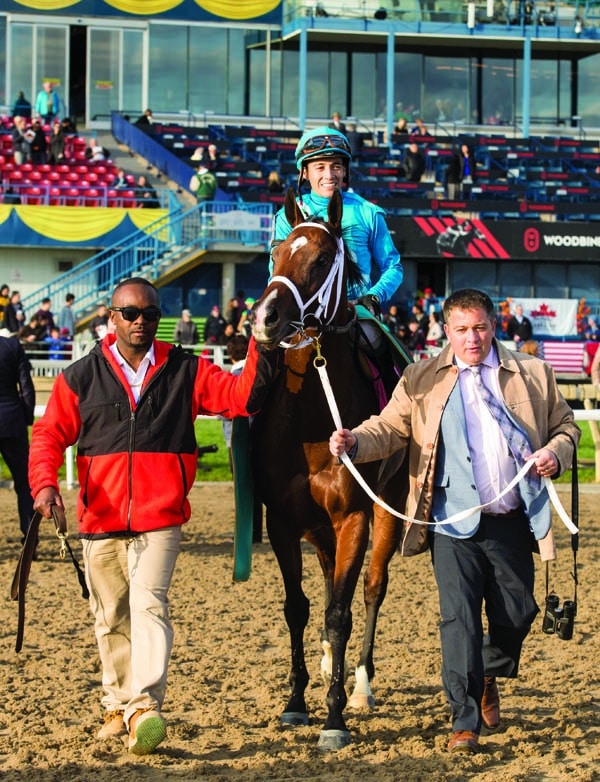Claiming races make up almost 80 per cent of horse racing today, but the format has come under fire this year [2020]. The idea of changing these races was brought up at both the Jockey Club Round Table in August and at a Stronger Together panel discussion hosted virtually by Woodbine Entertainment. On both occasions, the idea of eliminating claiming races in favour of a new system of rating the ‘bread and butter’ horses of the sport was discussed.
Claiming races, where horses are entered for a price and can be purchased up to 15 minutes before the race, have been around for a least a century. The mighty Seabiscuit raced for $2,500 claiming in the 1930s before he became a world famous horse. In 1943, Hirsch Jacobs claimed Stymie for $1,500 for his wife Ethel and developed him into one of America’s great handicap horses with 35 wins in 131 races and earnings of over $900,000.
The claiming system allows horses who are not of stakes or allowance calibre to race against horses at their own level, whether it be for $3,000 or $100,000 claiming.
There have been hundreds of success stories of horses being plucked out of claiming races that go on to fame. Conversely, horses can also be dropped into lower claiming races if the rigours of racing have taken their toll and an owner or trainer is attempting to make the result somebody else’s problem.
“The thought was to raise purses to help owners of claiming horses pay their bills and upgrade their stock over time. Instead, we have created an arena that has become a race to the bottom with horses being dropped in claiming price and repeatedly claimed as a matter of arbitrage.” ~ Sal Sinatra
The Case for a New System
Sal Sinatra, president and general manager of the Maryland Jockey Club, led the discussion at the Jockey Club Round Table calling for the end of claiming races. A former racing secretary, Sinatra says the system is broken because it puts the welfare of the horse in jeopardy and also discourages new owners.
Sinatra noted whether your buy or breed a horse, an owner will have anywhere from $50,000 to $100,000 (or more!) invested before it even gets to the races. If the horse is not still developing or not of stakes quality and its best chance is in a maiden claiming event, the horse could be claimed for much lower than what was spent on him, devaluing the horse and giving the breeder little financial return and no horse to race.
In addition, Sinatra said that the rise in purses for claiming races has led to more horses being dropped in claiming price, claimed and re-claimed.
“The thought was to raise purses to help owners of claiming horses pay their bills and upgrade their stock over time. Instead, we have created an arena that has become a race to the bottom with horses being dropped in claiming price and repeatedly claimed as a matter of arbitrage.”
Purses, for claiming races, Sinatra pointed out, have increased over the years while the claiming levels have not. The average purse in 2000 was $18,579, and by 2019 it was $32,257, an 80 per cent increase. On the other hand, in 2000 the average claiming price for a horse was $13,793; 20 years later, in 2019, it was $13,638, basically unchanged.
He also noted that the Equine Injury Database has demonstrated that a horse’s risk of fatal injury is elevated after it changes barns, and remains elevated for a considerable period of time after the change. This could be due to a variety of factors, including a lack of background knowledge each trainer has about the medical history, management, and training preferences the horse had in its last place.

Starship Jubilee and trainer Kevin Attard (right) after winning the 2019 E.P. Taylor Stakes at Woodbine. (Dave Landry photo)
“When a client approaches me, it is easier to sell them on possibly claiming a horse and maybe being back in the races in three weeks’ time with an opportunity to get some return on your investment. Obviously, they have to understand they are animals. They’re not machines. Sometimes the claims are going to be bad…” ~ Kevin Attard
The Case for the Status Quo
There are several ways to get a new owner into horse racing, but claiming is usually the most expeditious, offering almost immediate racing action. Claiming is also a particularly good way of attracting new owners who are not familiar with the sport, but who are intrigued and want to participate. There are many stories of owners who get their start by claiming and then become interested in the intricacies of breeding and eventually try to breed their own racehorse.
Sovereign Award finalist Kevin Attard has been one of the most successful claiming trainers in recent years in North America. His multiple champion Starship Jubilee was scooped from a race at Gulfstream Park in Florida for $16,000 and has gone on to win $2 million. Calgary Cat and Melmich were other success stories for Attard.
“When a client approaches me, it is easier to sell them on possibly claiming a horse and maybe being back in the races in three weeks’ time with an opportunity to get some return on your investment,” said Attard. “Obviously, they have to understand they are animals. They’re not machines. Sometimes the claims are going to be bad. They’re not worth what you paid for them. It’s like buying a used car. You go to the car dealership, you buy a used car—sometimes you’re buying somebody else’s problems. To me, horses are very similar in the sense. There is no warranty. There is no guarantee. You have to be prepared.”
Attard adds that the same uncertainty is just as prevalent when buying at a sale. “If you go to a sale, you could spend $300,000, $400,000 on a horse — it doesn’t mean it’s worth that at the end of the day.”
What the Class System Would Look Like
Sinatra proposed the idea of a rating system to replace the current claiming model. Horses would be rated by the track’s racing secretary, for instance on an A, B, C, D, etc. scale, and would move up and down the scale depending on their current form.
This system is used in greyhound racing, steeplechase racing and in horse racing in Europe and Australia. Quarter Horse racing has some claiming races but also a speed index system of rating horses.
Joe Clancy, an Eclipse Award winning writer who covers steeplechasing racing in the U.S., recently had editorials in the Mid Atlantic Thoroughbred discussing that sport’s rating system.
“Three handicappers – I’m one – assign a rating number to each active horse on the circuit, and we average those numbers to get an official rating … races are written based on the ratings and groupings.”
The condition might be, “a handicap hurdle for horses rated 120 and below.” Weights are assigned based on the ratings, so the highest-rated entry carries 158 pounds (scale weight for an older horse) and others slot in underneath based on their numbers where one ratings point equates to one pound. The bottom weight is usually 140.
“It’s all patterned after systems used in Ireland, England, France, pretty much every racing country other than the United States. In flat and jump racing, most countries use a handicap system as the backbone of racing. There are stakes, allowance, maiden races and handicaps. American racing leans on the claiming system, and it’s time that changes – something the National Steeplechase Association recognized a few years ago. The move resulted in bigger fields, longer hurdle careers and a subtle (if important) improvement in horse care and public perception.”
Clancy noted that a ratings system “creates competitive opportunities for all horses at all levels, without putting them at risk of claims” which can lead to horses making more starts because of the opportunity to race at various levels for their owners.
Attard is not a fan of a rating system, saying it would be possible to take advantage of the system by perhaps ensuring a horse fails at higher levels in order to race at lower level.
“When you set a claiming price on them, to me there (are) no games played. You are running the horse at a value you think it’s worth,” he said.
At the Stronger Together panel with Woodbine, trainer Mark Casse rebutted, “if you want to talk about corruption in racing we could talk about that all day long.”
In other words, the claiming game can also be manipulated; dropping a horse sharply in class when they may be on the verge of a serious injury has been known to happen.

Mark Casse. (Dave Landry photo)
“Maybe the big owners don’t want to hang on to the cheaper horses; this way they can put it up for sale on a website. If more than one person wants it, then you have a time limit and bidding.” ~ Mark Casse
Sales Website
Rather than claiming a horse, proponents of a rating system would like to see horse auction websites which would allow an owner to purchase a horse for racing.
“There are so many stables that have lots of horses that could go on a website at a track and be offered for sale,” said Casse. “For example, a stable like Darley that would have, in addition to its stakes horses, horses they don’t want to race that land in the $20,000 range. Put those up on a website and have people bid on them.”
Casse said he would like to see Woodbine have an online site where people can purchase a horse. “Maybe the big owners don’t want to hang on to the cheaper horses; this way they can put it up for sale on a website. If more than one person wants it, then you have a time limit and bidding.”
Clancy says auctions of horses of racing age should be a rule, not an exception.
“North American racing should follow the leads of most racing countries and find another way to write condition books, decrease the emphasis on claiming races, expand sales opportunities and, in turn, better answer horse welfare questions,” said Clancy.
“You care about your horses? Then why do you drop them down and lose them for a claiming price? Couldn’t you enter them in a sale, allow potential buyers to inspect them, let the market determine their value, get paid fairly and re-invest your sales proceeds in another horse while allowing some other owner or trainer a chance to do the same?”
Upending a century old classification of racehorses, the claiming game, is not something that will happen overnight, but the idea of reviewing and discussing if there is something better is only just heating up.


